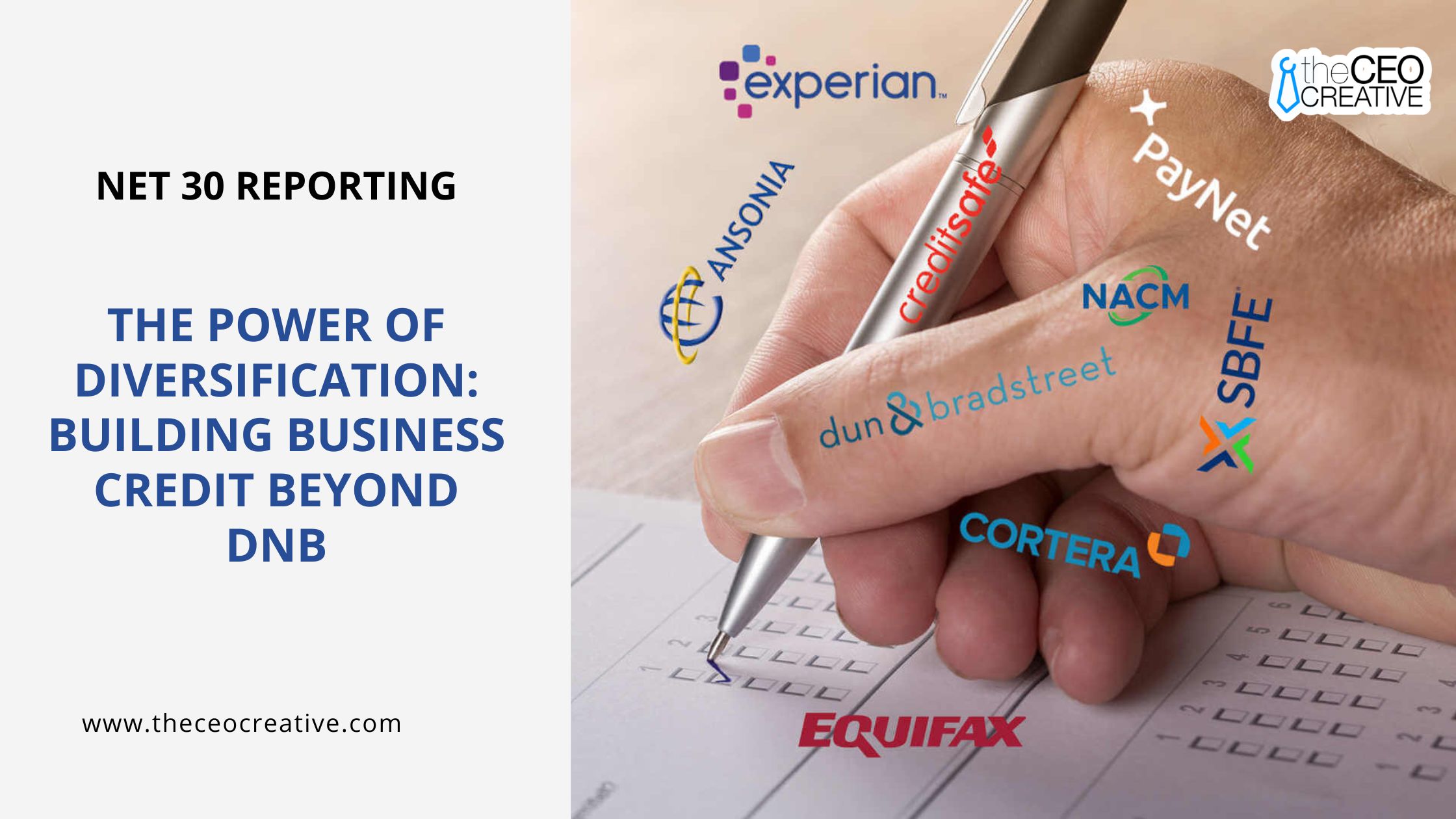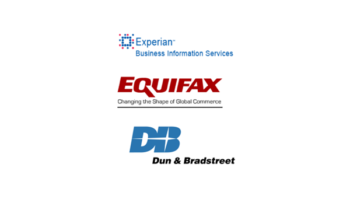Introduction
Every business owner understands the stress of creating and keeping good business credit. Many know Dun & Bradstreet ( DNB ) as a key credit agency, but did you know there are other options? Looking into other choices like Equifax and other credit agencies can improve your financial plan. Let’s see how expanding your credit options can help your business.
Understanding Business Credit
Business credit is like your company’s financial ID card. It shows lenders, suppliers, and potential partners how well your business manages its financial duties. Similar to personal credit, it impacts your ability to borrow money, rent property, and get better deals with suppliers. This small number gives a big picture of your business’s financial strength and trustworthiness.
Importance of Business Credit in Today’s Economy
In today’s fast-moving economy, having business credit is not just a choice—it’s really important. Your business credit score can help you get better loans, larger credit limits, and ultimately help your business grow. Without it, you could get stuck, unable to grow or even keep going when chances or unexpected problems come up. In simple words, business credit is like a financial safety net that helps you manage opportunities and risks.
Overview of the Major Business Credit Bureaus
When talking about business credit, three important companies are involved: Dun & Bradstreet (DNB), Experian, and Equifax. These companies gather information about businesses and use it to create a credit score or report.
– Dun & Bradstreet (DNB): This is one of the oldest and most well-known business credit companies. They use a score called Paydex, which looks at how well a business pays its bills by checking its payment history.
– Experian: This company is known for its detailed analysis of data. They give a Business Credit Score that shows how likely a business is to pay back loans, based on its financial and legal history.
– Equifax: While Equifax is famous for personal credit scores, they also provide business credit reports that help lenders decide if it’s risky to lend money to certain businesses.
Role of Credit Agencies
Credit agencies are like the backbone of the business credit system. They gather and look at information about your business’s money habits, like how well you pay your bills on time, any debts you have, and how strong your cash flow is. This data is very important for creating a trustworthy credit profile, which is what lenders and partners will check before deciding to work with your business.
These agencies are very important because they help shape how the financial world sees your business, and they have a lot of power. Even though each agency has its own ways of doing things and its own scoring systems, their main goal is always the same: to give accurate and complete information that helps people make good decisions.
The Limitations of Relying Solely on DNB
Dun & Bradstreet is a key player in business credit reporting, but it’s important to know that using only DNB might not provide a complete view of your business’s financial health. Let’s look at why using other credit bureaus, such as Equifax and Experian, could be a better approach to building business credit.
Explanation of DNB’s Paydex Score and What it Measures
The DNB Paydex score is a widely recognized business credit score. It assesses how well a business pays its bills, especially focusing on how timely it is with vendors and suppliers. The score goes from 0 to 100, with higher scores showing a better payment record. A score of 80 or more usually means the business is paying its bills on time.
Although this seems simple, the Paydex score mainly looks at one part of a business’s financial behavior—its payment history—which doesn’t fully represent the business’s overall creditworthiness or financial health. Other important factors, such as cash flow and unpaid debts, might not be considered.
Market Perception and Potential Bias
It’s important to remember that how the market views credit risk is mainly shaped by DNB scores. Many lenders and partners know about and check the DNB score. But, this strong focus on DNB could cause some unfair judgments. For example, if a lender only knows DNB’s rating system, they might ignore useful information from other credit agencies that give a more detailed view of a business’s credit health.
This bias could cause problems if your DNB score isn’t as good as your scores from other agencies. So, using a mix of different credit scores can help, especially when one agency’s data might not show your business in the best light, but another’s could present a more positive image.
Limited Reach and Data Variance
Depending only on DNB might limit how well you can build a complete credit profile. Each credit bureau collects data in its own way, which can cause differences or missing parts in your credit history. While DNB covers a lot, it might not include everything about your business dealings or the most recent information about your financial situation.
For example, DNB’s ways of gathering and creating reports could be different from Equifax or Experian. Each of these companies might offer extra insights with their own scoring methods. These insights could include legal documents, industry-related risks, or other important business activities that help create a well-rounded credit profile.
Additionally, the variability in credit data can influence how lenders perceive your business. By combining reports from various credit bureaus, you provide a more comprehensive picture of your business’s creditworthiness, reducing the chances of missing or incorrect information from any one source. Adopting this approach not only enhances your credit profile but also increases your chances of successful financial dealings.
To sum up, while Dun & Bradstreet is a major player in business credit, creating a strong credit profile involves considering the broader picture. By recognizing the advantages and limitations of DNB’s scoring system and combining it with data from other credit agencies, businesses can develop a more effective financial plan. Therefore, if you want to maximize your business credit potential, think about expanding beyond DNB and building a diverse and resilient credit base. Whether you’re a new business or an established one, the benefit of diversification can improve your financial strategies, leading to opportunities that might have previously seemed unattainable.
Benefits of Diversifying Business Credit Agencies
If you own a business, you understand how important it is to have a good credit history. But if you’re only using Dun & Bradstreet (DNB) to track your business credit, it might be time to consider other options. Using multiple credit agencies, like Equifax and Experian, in addition to DNB, isn’t just a popular idea—it’s a wise financial move. Let’s look at why getting credit reports from different agencies can greatly benefit your business.
Enhancing Creditworthiness
Expanding your credit reporting to include multiple agencies can greatly improve your business’s creditworthiness. Here’s why: each credit agency looks at your financial behavior in a slightly different way. By sharing your credit history with more than one agency, you increase your chances of making a strong impression. For example, a lender might trust Experian’s view of your credit health more than DNB’s, which could make it easier to get loans and credit lines with better terms.
Additionally, different agencies might gather different information about your payment history, financial stability, and overall business operations. This multi-faceted credit reporting gives a more complete picture of your business’s financial strength. It’s like showing different sides of a coin—each one valuable in its own right.
Access to Varied Financial Products
When you use multiple credit agencies to monitor your business, you can access a wider variety of financial products. By appearing on different credit reports, your business might be eligible for more options—like traditional loans, credit cards, lines of credit, and leasing deals. Lenders often prefer certain agencies for credit information, so sticking to just one could limit your options.
Think about it: a lender that works with Equifax might offer a great line of credit that could really help your business. But if all your credit history is only with DNB, you could miss out on this chance. Using multiple agencies means more opportunities, which could lead to better interest rates and financial terms that fit your business better.
Mitigating Risks Associated with Single Agency Dependence
Think of putting all your eggs in one basket. If that basket falls, you’re in trouble. The same idea applies to depending only on one credit reporting agency. If DNB’s information suddenly changes or if there are mistakes in your credit report, your business could face problems. By using more than one agency, you protect yourself from these risks.
Mistakes in credit reports happen more often than you might expect and can seriously affect your business’s finances. By using multiple agencies, if one makes a mistake, the others might not, keeping your business’s credit in good shape. This approach acts like a safety net, catching any errors or issues in the credit reporting process.
Net 30 Accounts as a Key to Diversification
Net 30 accounts are valuable tools in the business credit world. They help build a strong credit history with multiple credit reporting agencies, not just DNB. Let’s see how these accounts can be a key to expanding your credit options.
The role of Net 30 accounts in building credit across multiple bureaus
Net 30 accounts are deals with suppliers that let you pay for goods or services within 30 days of getting them. These accounts help you manage your money well and also help you build good credit. When you keep a Net 30 account, you’re showing that you can handle credit properly. If your suppliers tell credit agencies about your good payment history, it helps you build a strong credit reputation.
Here’s the key: when different credit agencies see that you pay on time, it makes your business look more reliable to lenders and partners. A credit profile with Net 30 accounts shows that you’re responsible and stable, making your business more appealing and trustworthy.
Why businesses should choose vendors that report to more than just DNB
Selecting vendors that report to multiple credit agencies can significantly benefit your business. It’s no longer just about maintaining a good reputation with DNB. Think about how much your credit profile could improve if positive payment experiences are recognized by Experian and Equifax too. This is a straightforward yet powerful way to show your business’s reliability and integrity to the financial world.
Think about the long-term advantages: when every payment is recorded and reported to several agencies, it’s like planting seeds in different areas. Over time, as these seeds grow and flourish, your business credit profile will show a diverse and strong record of financial success. Choosing vendors that report to multiple bureaus is an investment in your business’s future, expanding not only your credit profile but also the range of financial opportunities available to you.
When selecting these innovative vendors, you partner with companies that recognize the importance of reporting across multiple credit bureaus. It’s like teaming up with a top-tier group that bolsters your position in the financial world and sets you up for the next major step in your business growth.
To sum up, diversification isn’t just a smart strategy—it’s the route to growth, stability, and broader opportunities for your business. Financial experts agree: by using Net 30 accounts and working with various credit reporting agencies, you can boost your business to levels you might not have thought possible. So, open up those financial possibilities, and see your business take off.
Strategies for Building Business Credit Beyond DNB
Ready to start building your business credit? While Dun & Bradstreet (DNB) is a well-known company, it’s a good idea to also use other methods to make your business’s finances stronger. Let’s look at some smart ways to build business credit that go beyond just using DNB.
Identifying Alternative Credit Agencies
When you’re trying to build your business credit, it’s important to know all the choices you have. DNB is well-known, but there are other credit agencies you should also consider:
– Equifax: While they’re famous for personal credit reports, Equifax also helps with business credit. They give lenders a detailed look at how your business is doing financially.
– Experian: Another big name in personal credit, Experian is great at keeping track of business credit. Their reports often include useful information.
– CreditSafe: This agency is becoming more popular because they offer thorough credit reports and easy-to-use services, which is great for businesses wanting to explore different options.
By identifying these alternative agencies, you open doors to different perspectives on your business’s creditworthiness. Each agency has its unique system for evaluating credit, providing a fuller picture of your financial status.
Establishing Relationships with Multiple Agencies
After identifying the agencies, the next step is to develop strong relationships with them. This requires active involvement and highlighting your business’s solid financial practices. Here are some tips to begin:
– Register Your Business: Ensure your business is officially registered with these agencies. This is usually the first step to getting their attention.
– Regular Communication: Provide agencies with accurate and up-to-date financial information. This ensures they have the most recent data to evaluate your creditworthiness.
– Adopt Best Financial Practices: Agencies are more favorable towards businesses that show responsible financial management, such as paying bills on time and keeping a healthy cash flow.
By maintaining these relationships, you’re not just positioning yourself well with DNB, but also aligning with other agencies that can validate your business’s financial reputation through their reports.
Monitoring and Maintaining Diverse Credit Profiles
After you’ve built relationships, it’s important to regularly check and manage your credit reports from different agencies. This ensures your credit information is correct and consistent. Here’s how to stay on top of it:
– Regular Checks: Look at your credit reports regularly to find and fix any mistakes or issues early. The quicker you fix them, the less they’ll affect your credit score.
– Mix of Credit: Use different types of credit. Having a variety of credit accounts, like loans and credit cards, shows you can manage different kinds of credit well.
– Stay Updated: Keep track of changes in how credit scores are calculated or reported. Agencies might update their methods, and staying informed helps you adjust your strategy.
Keeping track of and updating your credit records with various agencies helps you demonstrate stability and trustworthiness to possible lenders or partners. It’s like being the star of the financial scene, where everyone knows about your business’s excellent credit history.
By using these methods, you’re ready to take advantage of diversification to create a strong business credit profile that goes beyond DNB. Here’s to expanding opportunities and building a more secure financial base!
Conclusion
Expanding your business credit strategies provides many advantages and helps build a strong financial base. By not just using Dun & Bradstreet (DNB), you can explore more credit options and show a more complete financial picture to possible lenders. Strategic expansion includes:
– Working with other credit agencies, like Equifax
– Keeping strong relationships with vendors and suppliers
– Checking reports often for any errors
Keep in mind, a varied credit profile not only secures your business’s future but also supports growth and adaptability in the constantly changing financial world.








